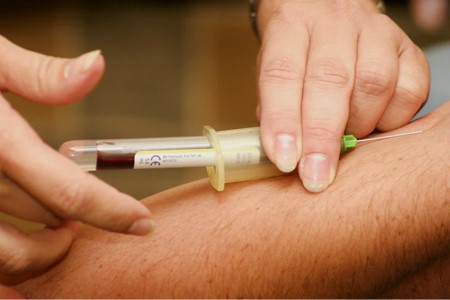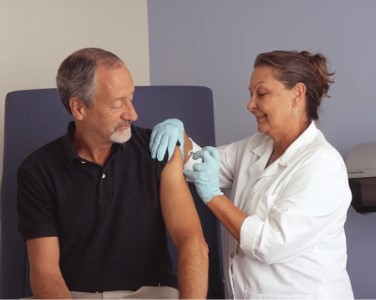
Testosterone is a hormone produced primarily in the testicles which help to maintain men’s muscle strength and mass as well as bone density, fat distribution, red blood cell production, sex drive, sperm production, body hair, and facial hair.
 Risks of Testosterone Replacement TreatmentsÂ
Some research shows that testosterone replacement treatments can cause skin conditions such as acne. In some patients, testosterone replacement treatments may cause breast enlargement and male breast cancer. It is important to note that while there is no known physiologic link of testosterone directly to the development of breast cancer, it has been suggested by studies that high levels of testosterone may lead to increased aromatization to an active derivative of estrogen, which ultimately may stimulate breast tissue receptors and increase the risk of male breast cancer. Testosterone replacement treatments may also stimulate too much red blood cell production which can actually contribute to an increased risk of forming a blood clot that can break loose and cause a pulmonary embolism, which is when a blood clot travels through the bloodstream, lodges itself in the lungs and blocks blood flow. If not treated immediately, a pulmonary embolism can turn out to be deadly. So, as you can see, testosterone therapy has various risks some of which, as noted in the previous sentence, are grave enough to provide good reason to stop receiving testosterone replacement treatments. Three more reasons are listed below for your consideration:Â
One: Benign Prostatic HyperplasiaÂ
One of the major risk factors associated with the administration of testosterone supplementation is its effect on the prostate. In some cases, testosterone replacement treatments may stimulate noncancerous growth of the prostate or spur the growth of existing prostate cancer in patients. The prostate is an androgen-dependent gland. Therefore, anti-androgen agents can decrease the prostate volume in patients with Benign Prostatic Hyperplasia or BPH. Because of this potential risk factor, you may wish to consider ending testosterone replacement treatments. Make sure to research how to stop TRT with Post Cycle Therapy or PCT, before doing so because you do not want to stop testosterone “cold turkey” since this may lead to unnecessary symptoms that could last for many months. This is one of the reasons many practitioners are often reluctant to administer testosterone in patients whom they suspect may have the low-grade disease of Benign Prostatic Hyperplasia or if they think that the patient may be at high risk for prostate cancer. Excess testosterone can wake sleeping tumors.
Two: Sleep Apnea May Develop or Worsen
In some cases, testosterone replacement treatments may cause sleep apnea, a potentially serious sleep disorder in which breathing repeatedly stops and starts, in patients or it may worsen in patients who already suffer from the condition. Sleep apnea causes daytime sleepiness as well and can kill people with the condition. According to medical studies, people who leave their sleep apnea untreated for just a short time may face a higher risk of spikes in blood sugar levels, stress, hormones, and blood pressure.Â
Three: Decreased Sperm Count and Infertility
In some cases, testosterone replacement treatments may limit sperm production causing infertility or testicles to shrink. Testosterone replacement treatments can lead to Hypothalamic-Pituitary-Testicular Axis dysfunction also known as HPTA. Extra testosterone can inhibit the release of the body’s own natural testosterone production through negative feedback inhibition on luteinizing hormone or LH levels. This feedback inhibition also results in suppression of follicle-stimulating hormone or FSH levels, which in turn lead to suppression of spermatogenesis which is the origin and development of the sperm cells within the male reproductive organs known as the testes. Young men undergoing testosterone replacement treatments need to be aware that their fertility can decrease to zero. Men who are young and wish to father children should be very cautious if they plan to use testosterone replacement treatments.

Factors such as exacerbation of prostate cancer, worsening benign prostatic hyperplasia (BPH), polycythemia, and an increased risk of obstructive sleep apnea (OSA) are all good reasons to reconsider receiving testosterone replacement treatments. It should be noted, however, that prostate cancer incidence in men receiving testosterone replacement treatments is similar to men not on testosterone therapy. If you are considering the discontinuation of testosterone treatments realize that there are certain protocols that can help restore your hormone axis. Always keep in mind that excess testosterone can wake sleeping tumors. Finally, common sense dictates that you should consult with a doctor who can safely guide you through the process of ending testosterone replacement treatments should you decide to do so for any of the reasons listed in this article.



Facebook Comments